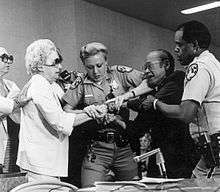Lillian Baker

Lillian Baker was a conservative author and lecturer who supported Japanese-American Internment throughout her career.[1][2]
Biography
Lillian Baker was the widow of a World War II veteran. Her activities began in the early 1970s, when she and others in California objected to the words "concentration camp" on a proposed state historical marker at the site of Manzanar. She opposed efforts to designate Manzanar a national historic site.[3][4]
Throughout her career, she downplayed the suffering of Japanese-American internees during the war, justified Japanese-American Internment, and opposed the government to pay reparations to Japanese-American internees, and opposed the government to formally apologize to interned Japanese Americans. She wrote several books on the topic of Japanese-American internment. "The Concentration Camp Conspiracy: A Second Pearl Harbor", "The Japanning of America: Redress and Reparations Demands by Japanese Americans", and "Dishonoring America: The Collective Guilt of American Japanese" are authored by her. One of her books, "American and Japanese Relocation in World War II: Fact, Fiction and Fallacy" appeared onto the shelves of the Arlington Heights Memorial Library in Chicago. Lilian Baker had gained support during her career. When two of her books, "The Collective Guilt of American Japanese" and "American and Japanese Relocation in World War II: Fact, Fiction and Fallacy", had been rejected by the Anaheim Public Library in 1991, two dozen World War II veterans and others led by Howard D. Garber, a member of the Republican Central Committee, protested in front of the Anaheim Public Library.[5][6][7]
Lilian Baker was a founding member of the National Trust for Historic Preservation, the International Club for the Collection of Hatpins and Hatpin Holders, and Americans for Historical Accuracy. She was listed on "Who's Who in America" and "Who's Who of American Women". In 1976, she was regional campaign manager for S.I. Hayakawa's U.S. Senate bid in California. Baker was given awards by the conservative Freedoms Foundation at Valley Forge.[8][9]
Baker died on Oct. 21, 1996 at her home in Gardena.[10]
See also
- Michelle Malkin conservative blogger, political commentator, and author of In Defense of Internment, which defended Japanese American Internment, and the racial profiling of Arabs.
References
- ↑ "History Her Way Revisionist's Defense Of Japanese Internment Reopens Old Wounds". Chicago Tribune. December 23, 1993.
- ↑ "Lillian Baker; Denied Japanese Incarceration". Los Angeles Times. October 29, 1996.
- ↑ "History Her Way Revisionist's Defense Of Japanese Internment Reopens Old Wounds". Chicago Tribune. December 23, 1993.
- ↑ "Lillian Baker; Denied Japanese Incarceration". Los Angeles Times. October 29, 1996.
- ↑ "History Her Way Revisionist's Defense Of Japanese Internment Reopens Old Wounds". Chicago Tribune. December 23, 1993.
- ↑ "Lillian Baker; Denied Japanese Incarceration". Los Angeles Times. October 29, 1996.
- ↑ "ANAHEIM : WWII Internment Books Spur Protest". Los Angeles Times. December 6, 1991.
- ↑ "History Her Way Revisionist's Defense Of Japanese Internment Reopens Old Wounds". Chicago Tribune. December 23, 1993.
- ↑ "Lillian Baker; Denied Japanese Incarceration". Los Angeles Times. October 29, 1996.
- ↑ "Lillian Baker; Denied Japanese Incarceration". Los Angeles Times. October 29, 1996.